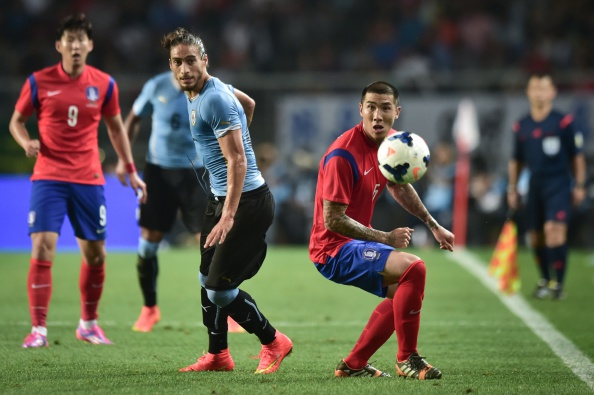South Korean national soccer team played a pair of games this past week, its first games since crashing out of the 2014 FIFA World Cup in Brazil in June without a win.
Playing against Venezuela and Uruguay, Korea split the two-game series with a convincing 3-1 win against Venezuela before suffering a 1-0 loss to the Uruguayans. Mixed results aside, Korea’s performances were much improved from its abysmal effort at the World Cup earlier in the summer, despite playing both games without a head coach, the recently appointed Uli Stielike. Shin Tae-yong, the soon-to-be assistant coach for Stielike, led the team.
Here are three things we learned from the new-look Korean national team.
Son Heung-min and Ki Sung-yueng, the only two players who impressed at the World Cup for Korea, are still the heart and soul of the team. The importance of these two was best exemplified in the 68th minute against Uruguay when Ki hit a marvelous 50-yard pass from deep in Korea’s half to find Son, who beat the opposing defense’s offside trap to break free for a clear chance on goal. Son’s shot was saved by the Uruguayan goalkeeper, but the play showed exactly why the two players are the backbone of their team. Ki’s ability to spray passes from deep, combined with Son’s speed to get to the end of those balls could serve as Korea’s No. 1 weapon as it aims to win the Asian Cup in January for the first time in 55 years.
Korea is more tactically flexible than many thought. One of the things that stood out at the 2014 World Cup in Brazil this summer was that there was not a true tactical trend unlike the previous World Cups. Each of the successful team played to its own strength and found success. For example, although the 4-2-3-1 formation has been the norm in modern soccer over the last decade, Holland made it to the semifinals by playing its exhilarating counterattacking soccer with a 3-4-3, while Costa Rica’s defensive solidity with a 5-3-2 made it the surprise team of the tournament. Meanwhile, Chile was one of the most entertaining teams to watch with its attack-minded 3-5-2 formation. A large part of Korea’s failure could be attributed to it being hellbent on the traditional 4-2-3-1, but against Uruguay, the team played variations of 3-4-3 and 3-6-1 and held its own versus the world’s sixth best team, according to FIFA.
Lee Dong-gook, the 36-year-old veteran forward who missed out on the opportunity to play at the World Cup in Brazil, could still be serviceable for Korea, but not as a permanent starter. There’s no question that Lee is a prolific scorer. He has scored over 160 goals in the domestic K-League and over 30 goals for the national team. His physical presence and lethal shooting ability in and around the opponent’s penalty box make him one of Korea’s greatest goalscorers of all-time. But it’s his lack of lateral speed and off-the-ball movement that have failed him against top opponents with elite defenses, which explains why he had a quite game against Uruguay’s stingy defense after scoring two goals against the Venezuelan team that’s more vulnerable defensively. Lee is a perfect fit for Korea when its gameplan is to proactively attack opponents, but he still seems out of place and isolated up front during games in which Korea’s main focus is to defend first and attack second.









